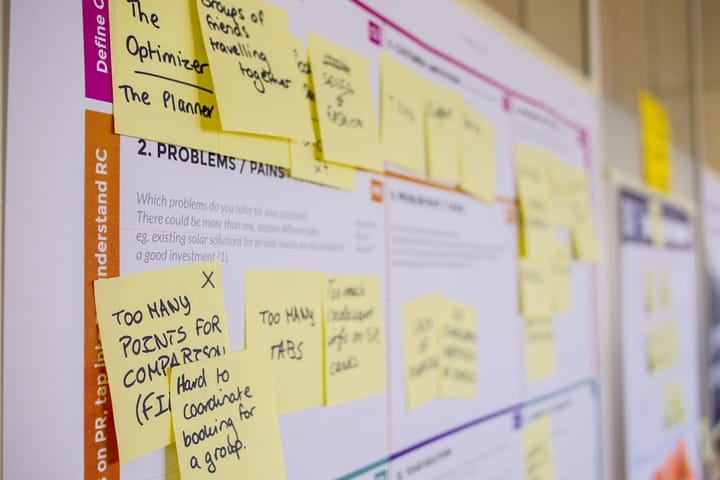The Ultimate Guide to Project Management Software: 🚀 Revolutionising Workflow Efficiency
Unlock project management success with the right project management software! This guide explores essential tools, features, and trends to enhance collaboration and streamline operations. Transform your workflows and achieve your project goals effectively today!

Effective project management is the cornerstone of business success in today's fast-paced digital landscape. 🚀 Enter project management software - the game-changing tool that's transforming how teams collaborate, plan, and execute projects. Whether you're a seasoned project manager or a small business owner looking to streamline operations, this comprehensive guide will navigate you through the ins and outs of project management software, helping you choose the right solution for your needs. ✅
Understanding Project Management Software: Your Digital Command Center
Imagine having a virtual headquarters where every aspect of your project lives and breathes. 💻 That's exactly what project management software offers. It's a centralised digital workspace that brings together planning, scheduling, resource allocation, and change management under one roof. Let's break down the core components:
- Task Management: Picture a complex project as a jigsaw puzzle. 🧩 Project management software allows you to break it down into manageable pieces. Tools like Trello employ visual Kanban boards, where tasks smoothly transition from 'To-Do' to 'Done', providing a satisfying sense of progress. 🎉
- Collaboration: Gone are the days of endless email threads and missed communications. 📧 Modern project management platforms foster real-time collaboration, turning your workspace into a vibrant digital meeting room where ideas flow freely. 💬
- Budget Tracking: Keep your project's finances in check with integrated budget management features. 💰 It's like having a financial guardian angel watching over your expenses. 👼
- Time Tracking: Envision a smart stopwatch that logs hours spent on tasks, ⏳ keeping team members accountable and helping managers optimise resource allocation.
The Evolution of Project Management: From Pyramids to Pixels
The concept of project management is as old as civilisation itself. 🏛️ The construction of the pyramids and the Great Wall of China were monumental projects that required sophisticated planning and coordination. Fast forward to the 20th century, and we see project management taking a more structured form during World War II, where large-scale coordination became crucial.
The digital revolution marked a turning point. 🌌 NASA's ambitious moon landing project in the 1960s required the development of sophisticated project management techniques, including Gantt charts and PERT charts. 📊 The 1980s and 1990s witnessed the emergence of digital Gantt charts and the formalisation of methodologies such as Waterfall, Agile, and Lean, significantly influencing modern project management software.
Types of Project Management Software: Finding Your Perfect Match
The world of project management software is diverse, catering to various needs and preferences:
- Desktop-Based Software: 🖥️ Installed directly on your computer, these tools are ideal for projects that don't require constant network access. Microsoft Project is a prime example, offering robust features for complex project planning.
- Web-Based/Cloud-Based Solutions: ☁️ Perfect for the modern, distributed workforce. Tools like Asana and Monday.com allow team members to access project data from anywhere with an internet connection, facilitating seamless remote collaboration.
- Open Source Options: For the tech-savvy crowd who love customisation, open-source project management tools like OpenProject offer the flexibility to modify code and tailor the software to specific needs. 🔧
Key Features: The Building Blocks of Effective Project Management
Task Management
Breaking projects into bite-sized tasks is the bread and butter of project management. Tools like Trello excel in this area, offering intuitive Kanban boards that make task progression visual and satisfying. 👍
Use Case: A marketing team launching a new product campaign can create a Trello board with columns for 'Ideation', 'In Progress', 'Review', and 'Complete'. Each task, from crafting social media posts to designing banner ads, becomes a card that moves across the board, giving the entire team a clear view of the campaign's progress.
Resource Management
Efficient allocation of time, people, and materials is crucial for project success. 🏗️ Microsoft Project shines in this domain, offering sophisticated resource levelling and capacity planning features.
Example: A construction company managing multiple building projects can use Microsoft Project to allocate equipment and personnel across different sites. The software can flag potential resource conflicts, such as when a specialised crane operator is needed at two sites simultaneously, allowing managers to adjust schedules preemptively.
Collaboration Tools
The synergy between project management software and communication platforms like Slack creates a powerful collaborative environment. 🔗 This integration breaks down geographical barriers, enabling real-time idea sharing and decision-making.
Use Case: A global software development team working on a new app can use Jira integrated with Slack. When a developer in India updates a feature's status in Jira, it automatically triggers a notification in a dedicated Slack channel, keeping team members in New York and London instantly informed without the need for emails or status meetings.
Reporting and Analytics
Data-driven decision making is at the heart of modern project management. 📈 Platforms like Monday.com offer robust reporting features that transform raw data into actionable insights.
Example: A non-profit organisation running multiple community projects can use Monday.com's dashboard to visualise key metrics like volunteer hours, funds allocated, and project completion rates across different initiatives. This bird's-eye view helps leadership identify successful strategies and areas needing improvement.
The ROI of Project Management Software: Tangible Benefits
- Productivity Boost: 🚀 With clear task delineation and automated workflows, teams can focus on what matters most. Asana users report up to a 45% increase in team efficiency after implementation.
- Enhanced Communication: Centralised communication eliminates information silos. Companies using collaborative project management tools like Basecamp have reported up to a 30% reduction in internal emails. 📉
- Smart Resource Allocation: Tools like Smartsheet allow for dynamic resource reallocation based on real-time project needs. One engineering firm reported saving over 100 hours per month on resource management after adopting Smartsheet. ⏱️
- Improved Time Management: Time tracking features in tools like Harvest not only improve punctuality but also provide insights into time-consuming tasks. A digital agency using Harvest found that they were underestimating project timelines by an average of 20%, leading to more accurate future estimates and improved client satisfaction.
Overcoming Implementation Challenges
While the benefits are clear, implementing project management software isn't without its hurdles:
- Cost Considerations: 💵 Premium tools with advanced features can be a significant investment, especially for larger teams. However, many providers offer scalable pricing models. For instance, Trello's free version is robust enough for small teams, while its Business Class and Enterprise options cater to growing organisations.
- Setup Complexity: Rolling out sophisticated software like Microsoft Project can be time-consuming. ⏳ However, many modern cloud-based solutions offer intuitive setups. Monday.com, for example, provides pre-built templates for various industries, significantly reducing onboarding time.
- Learning Curve: 📚 Even user-friendly platforms require an adjustment period. Successful organisations often designate "power users" who become internal experts and trainers. Asana's Guide to Successful Deployment outlines a phased approach, starting with a pilot team before company-wide rollout.
Choosing the Right Tool: A Strategic Approach
Selecting the ideal project management software requires careful consideration of several factors:
- Team Size and Project Complexity: Larger teams handling intricate projects may benefit from feature-rich platforms like Jira, while smaller teams might find Trello's simplicity more appealing.
- Budget Constraints: Open-source options like OpenProject can offer significant savings, while premium versions of tools like Monday.com provide dedicated support and advanced features.
- Scalability: Ensure your chosen platform can grow with your business. 📈 Look for tools with flexible pricing tiers and the ability to add or remove features as needed.
- Integration Capabilities: The ability to connect with your existing tech stack is crucial. Jira, for instance, offers extensive integration options, seamlessly connecting with over 3,000 apps through the Atlassian Marketplace.
Success Stories: Learning from the Best
Tech Sector Triumph
Spotify, 🎶 the music streaming giant, leveraged Jira's Agile project management features to accelerate their product development cycles. By implementing autonomous cross-functional teams called Squads and fostering a culture of collaboration and innovation, they experienced significant improvements in their development cycles. While specific performance metrics are not publicly available, this approach has generally allowed Spotify to adapt quickly to market demands and efficiently deliver new features. It's important to note that Spotify's model has evolved over time and emphasises organisational flexibility rather than adherence to specific tools or rigid methodologies.
Marketing Mastery
A mid-sized digital marketing agency adopted Asana to manage their multi-channel campaigns. 📅 By utilising Asana's timeline feature and task dependencies, they improved on-time project delivery by 40% and client satisfaction scores by 15%.
Non-Profit Narrative
A global humanitarian organisation implemented Trello to coordinate disaster relief efforts across multiple countries. 🌍 The visual nature of Trello boards allowed for quick status updates and resource allocation, leading to a 30% improvement in response times during critical situations.
Future Trends: The Next Frontier in Project Management
AI and Predictive Analytics
The integration of artificial intelligence is set to revolutionise project management. 🤖 Tools like Monday.com are already incorporating machine learning to predict potential project delays and suggest optimal resource allocation.
Future Use Case: Imagine an AI-powered project management assistant that analyses historical data to predict potential roadblocks in your upcoming software release, suggesting preemptive actions to keep the project on track.
Advanced Remote Collaboration
As remote work becomes the norm, expect project management tools to offer more immersive collaboration experiences. 🌐 Virtual reality (VR) and augmented reality (AR) integrations could transform how distributed teams interact and visualise projects.
Potential Scenario: A construction project manager could use AR glasses to overlay digital project plans onto a physical construction site, allowing real-time collaboration with architects and engineers located miles away.
Hyper-Customisation
The future of project management software lies in extreme personalisation. 🔄 Expect to see platforms offering AI-driven interface adjustments that adapt to individual user behaviors and preferences.
Example: A project management tool that automatically adjusts its dashboard layout based on your role, frequently used features, and even the time of day, ensuring you always have the most relevant information at your fingertips.
Security and Compliance: Safeguarding Your Project Data
In an era of increasing data breaches and stringent privacy regulations, security is paramount. 🔒 Look for project management tools that offer:
- End-to-end encryption
- Compliance with standards like GDPR, HIPAA, and SOC 2
- Regular security audits and penetration testing
Best Practice: Implement role-based access control (RBAC) within your project management tool. This ensures team members only have access to the information necessary for their roles, minimising the risk of data breaches.
Optimising Your Project Management Approach
Foster a Culture of Transparency
Encourage team members to update their progress regularly. Tools like Asana allow for easy task updates, fostering a culture of accountability and reducing the need for status meetings.
Integrate, Integrate, Integrate
Maximise efficiency by connecting your project management tool with other business apps. Use integrators like Zapier to create automated workflows. 🔗 For instance, set up a Zap that automatically creates a new Trello card when a customer submits a request through your CRM system.
Continuous Learning and Adaptation
The project management landscape is ever-evolving. Encourage your team to stay updated on new features and best practices. Many project management software providers offer free webinars and certification programs. 📖 For example, the Atlassian University provides comprehensive Jira training courses for various skill levels.
Dispelling Common Misconceptions
"Project Management Software is Only for Tech Companies"
This couldn't be further from the truth. From schools coordinating curriculum development 📚 to non-profits managing volunteer programs 🤝, project management tools have universal applications.
"It's Too Complex for My Small Business"
Many platforms offer scalable solutions perfect for small teams. Trello's intuitive board system can be mastered in minutes, providing immediate value without a steep learning curve.
"We Can't Afford It"
While some enterprise solutions can be pricey 💸, many providers offer free tiers or affordable plans for small teams. The productivity gains often outweigh the costs, even for budget-conscious organisations.
Wrapping Up: Your Path to Project Management Excellence
In today's fast-paced business environment, effective project management is not just an advantage – it's a necessity. The right project management software can transform chaotic workflows into streamlined, efficient processes, driving productivity and fostering innovation. 🌟
As you start your project management software journey, remember that the perfect solution aligns with your team's unique needs and work style. Whether you opt for the visual simplicity of Trello 📊 , the comprehensive features of Microsoft Project 📈 , or the customisable workflows of Monday.com 💼 , the key is to choose a tool that grows with your organisation and empowers your team to achieve their best work.
Embrace the power of project management software ✨ , and watch as your projects transform from juggling acts into symphonies of coordinated success. 🎶 The future of work is here – are you ready to lead the charge? ⚡
📬Enjoyed this post? Want to stay on top of the latest trends and best practices in sustainable project management? Subscribe to our newsletter for expert insights, practical tips, and resources delivered straight to your inbox.



